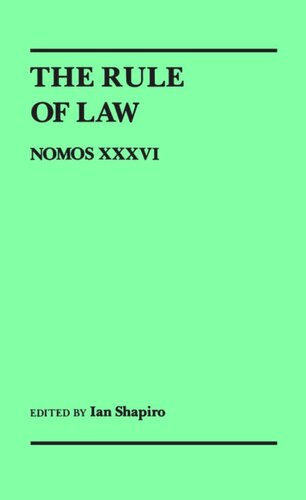

Most ebook files are in PDF format, so you can easily read them using various software such as Foxit Reader or directly on the Google Chrome browser.
Some ebook files are released by publishers in other formats such as .awz, .mobi, .epub, .fb2, etc. You may need to install specific software to read these formats on mobile/PC, such as Calibre.
Please read the tutorial at this link: https://ebookbell.com/faq
We offer FREE conversion to the popular formats you request; however, this may take some time. Therefore, right after payment, please email us, and we will try to provide the service as quickly as possible.
For some exceptional file formats or broken links (if any), please refrain from opening any disputes. Instead, email us first, and we will try to assist within a maximum of 6 hours.
EbookBell Team

0.0
0 reviewsFrom the sprawling remnants of the Soviet empire to the southern tip of Africa, attempts are underway to replace arbitrary political regimes with governments constrained by the rule of law. This ideal which subordinates the wills of individuals, social movements--and even, sometimes, democratically elected majorities--to the requirements of law, is here explored by leading legal and political thinkers.
Part I of The Rule of Law examines the interplay of democracy and the rule of law, while Part II focusses on the centuries-old debate about the meaning of the rule of law itself. Part III takes up the constraints that rationality exercises on the rule of law. If the rule of law is desirable partly because it is rational, then departures from that rule might also be desirable in the event that they can be shown to be rational. Part IV concentrates on the limits of the rule of law, considering the tensions between liberalism and the rule of law which exist despite the fact that reasoned commitment to the rule of the law is preeminently a liberal commitment.
Contributing to the volume are: Robert A. Burt (Yale University), Steven J. Burton (University of Iowa), William N. Eskridge, Jr. (Georgetown University), John Ferejohn (Stanford University), Richard Flathman (Johns Hopkins University), Gerald F. Gaus (University of Minnesota, Duluth), Jean Hampton (University of Arizona), Russell Hardin (University of Chicago), James Johnson (University of Rochester), Jack Knight (Washington University), Stephen Macedo (Harvard University), David Schmidtz (Yale University), Lawrence B. Solum (Loyola Marymount University), Michael Walzer (Princeton University), Catherine Valcke (University of Toronto), and Michael P. Zuckert (Carleton College).